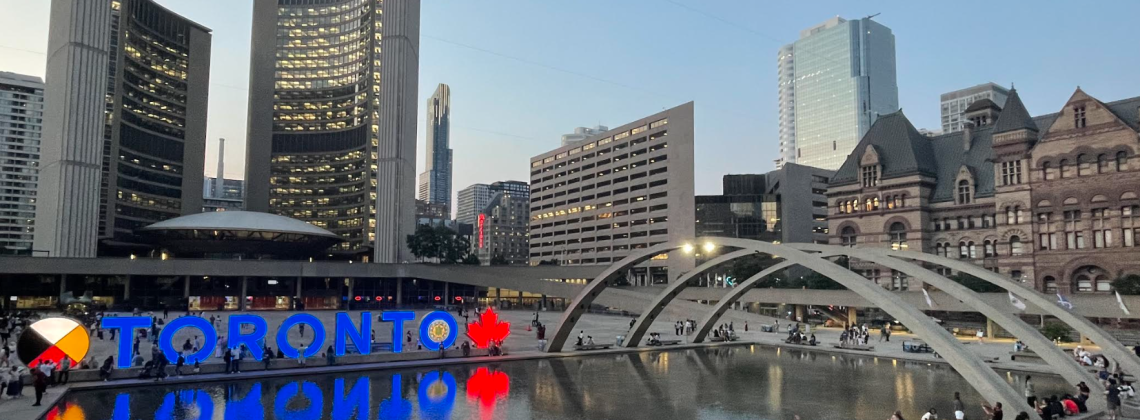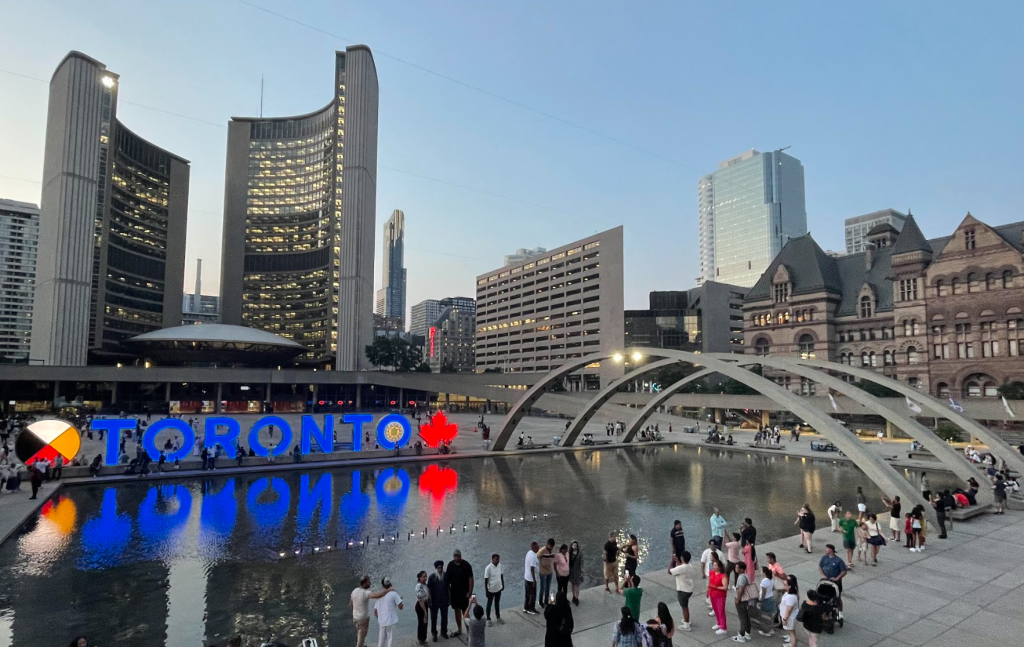

Toronto helps us remember the promise of the word social
Toronto is Brasília writ north.
Brasília, in a swirl of cranes and concrete, arose as if by magic in the 1960s, testament of a hope and a dream and a lot of brute force. Where just years before there was only a swath of savanna, a nation’s capital was born, complete with a grand artificial lake. Power can serve the world with clean and upright efficiency, Brasília’s sleek towers announce. It is for you, this power, democratically mediated and poured out. Brasília’s architects designed the city in the shape of an airplane. Which is also the shape of a cross.
Toronto is more modest in ambition—a provincial capital with some hard history, including its pillaging by American soldiers in the War of 1812. It sits in quiet repose alongside a truly great lake, dwarfed, somehow, by still water. The city doesn’t shout at you, as you drive north. Its tall, calm skyline reflects the surrounding serenity. Most of its skyscrapers aren’t bedecked with branding, and what names do appear on them conform to a modest scale. Balconies extending from high-rise apartments abound. A majestic modern spire, presiding over the skyline, lures the eye upward and beyond.
Today it’s easy to forget the great purity of the modern vision, as a century ago it flashed up and down the hemisphere and across the sea. Toronto’s New City Hall (1965) is close kin to Brasília’s Palácio do Congresso Nacional (1960), towers of power softened by spherical shapes, 4500 miles apart. Any stranger wandering into that family reunion would immediately see the resemblance, a nearness of ideals illumined by a single hope: that the ordinary realities of life—magnified in the industrial age—can be aided and enhanced by life together. This was a moral vision that by the early twentieth century was denoted by the single all-purpose word social—as in “the social question,” social security, social welfare, social justice, social work.
And social democracy. There were less-than-social forms of democracy at large, and some that were decidedly antisocial if you lived beyond the walls of the democratic majority. To invoke “the social,” in that transitional moment, was to enlarge and ennoble the us.
Crucially, in many countries the reality of that us came to require not simply protection of a person’s rights but the care of one another’s bodies. What we’ve come to call “health care” became a test of common decency: Will we, or will we not, marshal the expanding reach of medicine—a profoundly collaborative, increasingly state-funded endeavor—for the sake of all?
Canada gradually took up this charge, one as challenging as any in the emergent political-economic maelstrom the late Sheldon Wolin dubbed “Democracy Inc.” To pull market-driven forces in the direction of the common good required (and has always required) an authority situated beyond them, sources of hope and strength that predate global capital and that will outlast it. What might these sources be?
They might just include saints. On a recent trip to Toronto our Airbnb host told us that our condo was across from St. Raphael’s. We looked for a church. It turned out to be a dentistry practice, named for, as their site says, “the archangel responsible for healing.” Next to it, covering two blocks, was St. Michael’s: a hospital complex that includes a landing pad atop one of its buildings, where we, from the thirtieth floor, witnessed a helicopter delivering a patient late at night.
What we could also see from the thirtieth floor is that directly behind the hospital sits St. Michael’s Cathedral, consecrated in 1848. It too spreads out over much of a city block. The hospital, it turns out, was founded in 1892 by the Sisters of St. Joseph. A great fund of social democracy, with its own structures and communions, is still in place.
Today social democrats are often denigrated with a sneering designation: idealists—or worse, utopians. But the only kind of realism that endures understands that if ideals fail to direct our reality our reality will destroy us. That’s realism.
What could be more realistic than to seek to bring human beings into communities dedicated to care, rather than conflict? What could be more realistic than to extend that care to the whole person, body and spirit? What could be more realistic than to organize forms of funding for that care that come from the community at large: social insurance? Absent this kind of realism, “reality” begins to feel like war. As we know.
Back in that more hopeful age of “the social”—when, for instance, the professions were still construed as forms of service—it made sense to tens of thousands across the emergent democracies to create organizational structures that would make service on behalf of the public good possible. And so the institutions of social medicine took shape. If today we find ourselves distressed by the seizing of those institutions for pecuniary (and often desecrating) ends, we should, all the same, not be surprised. Ideals are always frustrated and are always—honesty requires us to add—frustrating. That’s no reason to pretend we don’t need them—or that their presence (or absence) isn’t what finally defines us.
Of course, the world that gave birth to the original St. Michael’s is gone and is not coming back, whatever the revanchist delusions of our age may shout. But the descendants of St. Michael’s are all around us, and so is their language. Watching the Canadian Broadcasting Corporation’s coverage of the Olympics, we were captivated by the appeal, in advertisements and commentary alike, not to a nation so much as an us. “Canada is a team we all belong to.” “We all play for Canada.” An update on a score ran across the bottom of the screen: “We lost today . . .”
One afternoon we took the ferry to Toronto’s Centre Island, where on warm days thousands from seemingly every tribe and nation roam and play and sleep and swim, and where automobiles are banned. Greeting us, as we disembarked, was a sign that made us laugh: Please walk on the grass. So Canadian, we joked. And so good. We walked on the grass. And I remembered, as if reaching back into a youthful dream, that man is not made for the nation but the nation for man.
Our forebears in that earlier age—those social reformers—knew some things we can’t afford to forget. They knew the modern world was arriving, ready or not. They knew that we need to find ways to live—truly live—within it—and so must give ourselves to shaping its forms and, at times, defying them. By joining ourselves to their reforming vision as well as the transcending sources behind it, we can, however small the scale, restore some health to a bloodied world. Grass is made to walk on. People are made for each other. Ideals deserve to be honored, even with our lives.
That’s what the saints tell us, at least.
Eric Miller is Professor of History and the Humanities at Geneva College, where he directs the honors program. His books include Hope in a Scattering Time: A Life of Christopher Lasch, and Brazilian Evangelicalism in the Twenty-First Century: An Inside and Outside Look (co-edited with Ronald J. Morgan). He is the Editor of Current.
Photo credit: the author
“If ideals fail to direct our reality our reality will destroy us.”
Wow.
Of course, the wrong ideals can destroy us, too. We’re a pretty vulnerable lot.
That latter point is better known, I think. But when I look at Christian higher Ed, just eg and all that, in light of your observation, a lot falls into place.
I second John’s “wow”.
Leaving for Montreal on a family trip this week. Looking forward to walking on the grass.